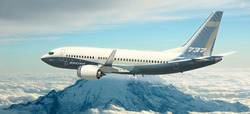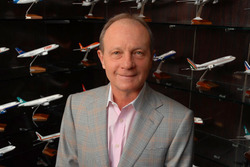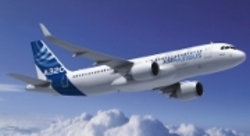- Latest edition February 5th: Deliveries to reach $120 billion in 2026
- Latest edition January 22nd: Two deals open 2026 ABS market
- Latest edition January 8th: Outlook
- Latest edition December 11th: Year in Review
- Latest edition November 27th: Solid business in Dubai
- Latest edition November 13th: Headwinds and tailwinds
|
Will the MAX and NEO be game-changers? The first lessor to order both the Max and the NEO gives the views of Aviation Capital Group
Newport Beach, California - based lessor Aviation Capital Group (ACG) was involved in one of the headline deals at the 2011 Dubai Airshow when it announced an order for 30 fuel-efficient Airbus A320 NEOs. The deal which is valued at $2.74 billion, is part of the firm's long-term fleet plan. ACG also announced an order for 35 Boeing 737 Max aircraft. The Boeing commitment by ACG makes it the first identified lessor of the 737 Max. In this exclusive interview with Aviation Finance, ACG's CEO Stephen Hannahs talks about the order, the MAX and the NEO.
We asked ACG's chief executive Stephen Hannahs why ACG choose to make the order and become the first leasing firm to make a commitment to the MAX and NEO.
Hannahs said that ACG's business model focuses on narrow body single aisle airplanes and both the MAX and the NEO will be evolutionary to the current A320 and 737NG. As such, it is important for ACG to have the aircraft available for its customers. He added that this is because the NEO and the MAX offer significant fuel efficiencies, and will be amongst the most capable airplanes with the lowest operating costs. He also said that considering there is going to be a limited production cycle for the MAX and the NEO 'once we decided we were going ahead (ordering the planes) we did it sooner rather than waiting'.
With such a strong endorsement of the NEO and MAX by ACG, did he think that the two are game-changers for the industry? 'I would say that they are evolutionary rather than revolutionary. They will not replace the NG and the current Airbus A320.' He said the airframe is essentially the same but there is a significant development in the engine technology. 'The Max and NEO will tell us a lot for instance about geared technology'. If the MAX and the NEO prove popular what impact will it have on valuations of existing Boeing 737s? Hannahs says that in the 'initial stages there won't be much residual valuation impact.' This is because initially only 300 units a year will be produced. 'For valuations to be affected there would need to be a much larger number of planes in service'. Looking at the full capabilities of the Max does Hannahs think that MAX has the potential to meet requirements of existing Boeing 757 operators? . 'As far as the 737-9 model is concerned, Max will answer some of the questions.The MAX will have 90 per cent capability of the 757. However, the 757 will have greater capabilities and still has unique applications". He conjectures that this would be in the region of 2,000 to 2,500 units. Hannahs does, however, believe that the MAX and NEO may have an impact on commercial terms in financing. With a more conservative banking environment, banks 'will be looking at new airplanes and will be cautious on loan exposure on current aircraft types'.
Looking at the full capabilities of the MAX, does he think that it will have the potential to meet requirements of existing Boeing 757 operators? 'There is a lot we still don't know about the MAX', he says. As far as the 737-9 model is concerned, Max will answer some of the questions. The 737-9 MAX will probably have 90 percent of the capability of the 757. The 757 had unique applications, he says. If the MAX and the NEO prove popular what impact will it have on valuations of existing Boeing 737s?. Hannahs says that in the 'initial stages they won't have much residual valuation impact.' This is because initially only 300 units a year will be produced. For valuations to be affected there would need to be a much larger number of planes produced. He says there would need to be somewhere in the region of 2,000 to 2,500 units to have an impact on residuals. He does, however, believe that the MAX and NEO may have an impact on other elements of the financing space. With a more conservative banking environment, banks 'will be looking at new airplanes and will pull back on existing aircraft' .'Lenders will be less willing to lend to existing NGs with the MAX and the NEO in the market', he predicts. This article appeared in Aviation Finance Vol 1 No. 7, December 8th 2011 December 8th 2011. |
Vol. 1 Issue 7 of Aviation Finance



